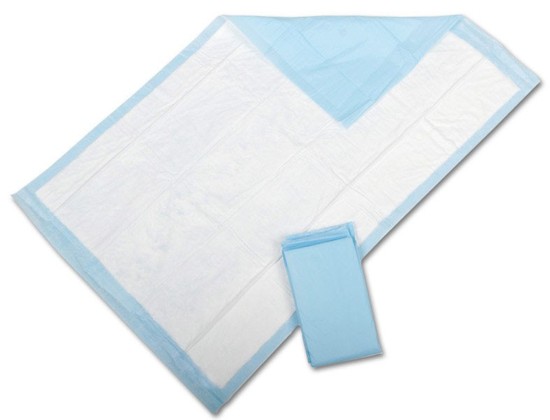Urinary incontinence is the most common type of incontinence, although some patients also experience bowel incontinence. The cost of caring for these patients can be very high. Whether the patient is in the hospital, nursing home or at home, supplies such as incontinent underpads, are a necessary thing. The typical thought when your hear the term incontinence, is that the person is bedfast or wheelchair confined, but this is not always the case. There are many people who function quite well in a job and society, that have problems with incontinence.
In the hospital, patients should be treated as individuals and choices should be given to them about their own care whenever possible. The patient should be treated with respect and according to the clinical need, rather than age. A significant proportion of people in the hospitals today, are over the age of 65.
Approximately 35% of the patients that are over the age of 65, experience incontinence. Some of these patients had the problem prior to being admitted to the hospital and will continue to have incontinence when they are discharged. These patients are often accustomed to using incontinent underpads when going to bed. With the elderly, incontinence is often related to impaired cognitive condition or with the treatment of urinary tract infections.
Good bedside nursing is highly important with the incontinent patient. If the patient is unable to get out of bed or even turn themselves, then good skin care is a high priority. If incontinence of urine continues on a regular basis, there will be a need for incontinent underpads for the patient.
Incontinent underpads are available in 17" x 24" and 23' X24" size. This allows for comfort for the different size patients. These pads are very absorbent and are filled with soft fluff. The backing on the pads are a non-skid waterproof blue. All four sides of the pads are sealed to help prevent leaking. They are available in 300/case and 200/case. These pads will need to be changed every few hours or as needed and the skin needs to be cleansed thoroughly with soap and water. After patting the patient dry with a soft towel, apply a moisture barrier.
Bowel incontinence can be the result of a disease process or because the patient is unconscious. If the patient is conscious, offer the bedpan on a regular basis to help avoid the incontinence. The use of the incontinent underpads makes the patient more comfortable and at the same time helps prevent the need for the linen to be changed frequently. Thoroughly cleansing the patient in the same manner after bowel incontinence helps prevent skin breakdown. The bowel movement can soil hair in that area and can often be harder to remove.
Patients are often embarrassed and even humiliated that they are incontinent and need incontinent underpads. Some patients will even stop eating or drinking so that they won't be incontinent, this can cause serious problems. It is very important that you communicate with the patient, maintain privacy, provide an adequate amount of time for urine and bowel functions, and listen to their concerns.
In the hospital, patients should be treated as individuals and choices should be given to them about their own care whenever possible. The patient should be treated with respect and according to the clinical need, rather than age. A significant proportion of people in the hospitals today, are over the age of 65.
Approximately 35% of the patients that are over the age of 65, experience incontinence. Some of these patients had the problem prior to being admitted to the hospital and will continue to have incontinence when they are discharged. These patients are often accustomed to using incontinent underpads when going to bed. With the elderly, incontinence is often related to impaired cognitive condition or with the treatment of urinary tract infections.
Good bedside nursing is highly important with the incontinent patient. If the patient is unable to get out of bed or even turn themselves, then good skin care is a high priority. If incontinence of urine continues on a regular basis, there will be a need for incontinent underpads for the patient.
Incontinent underpads are available in 17" x 24" and 23' X24" size. This allows for comfort for the different size patients. These pads are very absorbent and are filled with soft fluff. The backing on the pads are a non-skid waterproof blue. All four sides of the pads are sealed to help prevent leaking. They are available in 300/case and 200/case. These pads will need to be changed every few hours or as needed and the skin needs to be cleansed thoroughly with soap and water. After patting the patient dry with a soft towel, apply a moisture barrier.
Bowel incontinence can be the result of a disease process or because the patient is unconscious. If the patient is conscious, offer the bedpan on a regular basis to help avoid the incontinence. The use of the incontinent underpads makes the patient more comfortable and at the same time helps prevent the need for the linen to be changed frequently. Thoroughly cleansing the patient in the same manner after bowel incontinence helps prevent skin breakdown. The bowel movement can soil hair in that area and can often be harder to remove.
Patients are often embarrassed and even humiliated that they are incontinent and need incontinent underpads. Some patients will even stop eating or drinking so that they won't be incontinent, this can cause serious problems. It is very important that you communicate with the patient, maintain privacy, provide an adequate amount of time for urine and bowel functions, and listen to their concerns.

 RSS Feed
RSS Feed